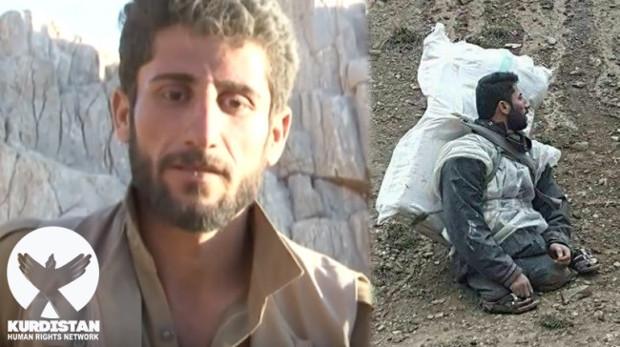
A photo of Younes Feizi, the young Kurdish Kolber from Piranshahr who has lost both his legs in a landmine blast in childhood, has been widely shared on social media over the past few days. This photo has attracted the public’s attention to the issue of Kolbers and the wretched condition of this hardworking community in Kurdistan. The government has never allocated any special benefits for victims of landmine blast to this Kurdish Kolber who has been working as a Kolber and doing labour work since then.
The Kurdistan Human Rights Network has interviewed with Younes Feizi in 2013 and asked him about his biography and reasons for choosing this job.
Fayzi had gone to the mountains along with his sister and brother in order to collect some herbal plants during his childhood when a Landmine Exploded and he lost both his legs while his sister and brother lost their life.
“23 years (now 27 years) has passed since this incident but I have never asked anyone to cover my living expenses. I have always earned my own living and I have sometimes helped others as well”, Younes Said.
When asked Younes why he had chosen this job, he stated:
“My family’s poor financial situation and being the breadwinner of the family forced me to choose this exhausting job because I am the only person responsible for my mother and younger siblings. I have to carry three or four heavy loads each day without assistance from anyone despite the many difficulties and dangers involved such as travelling through impassable routes, hunger and thirst, low wage, being shot/ arrested and finally death,”.
In answer to the question about how he saves himself from ambush and siege of security forces despite having no legs, Younes replied:
“If I’m targeted, I will leave the horse and loads and I will run away as fast as I can. Otherwise, I will run away with the horse.
Luckily, I am stronger and more energetic than other Kolbers despite my situation and I never ask anyone for help. I am not indebted to anyone.”
“It’s true that I have lost both my legs, but I believe that:
When One Door shuts, a hundred other doors open”, he added.
Younes Feizi is married and he has a son.
But who are the Kolbers?
‘Kolber’ is a Kurdish compound word consisting of ‘Kol’ (meaning ‘back’) and ‘ber’ (meaning ‘picking up and carrying’). Kolbers are people who risk their lives to carry various foreign goods (such as fabrics, tea, audio-visual goods and rarely alcoholic drinks) on their own back or on the back of horses to deliver them to the goods’ owners at the Iranian border territories from border areas of neighbouring Kurdish regions in Iraq and Turkey while travelling through impassable routes.
In order to earn a living for their family’s survival, Kurdish Kolbers and tradesmen are in constant danger of being shot by Armed Forces of the Islamic Republic of Iran, landmine explosion, drowning in the river, avalanche fall, frostbite, falling into the valley, etc. According to the statistics, most victims have been killed due to being shot by Armed Forces during the previous years.
The majority of Kurds living in the Kurdistan Province in Iran who choose to work as Kolbers are well aware of the dangerous working conditions of this job. However, they have no other choice due to lack of macro-economic infrastructures, discrimination in allocating annual budgets to Kurdistan, high unemployment rate, lack of alternative jobs, little investment in the domain of agriculture, mine and tourism.
Kurdistan Human Rights Network ─ KHRN